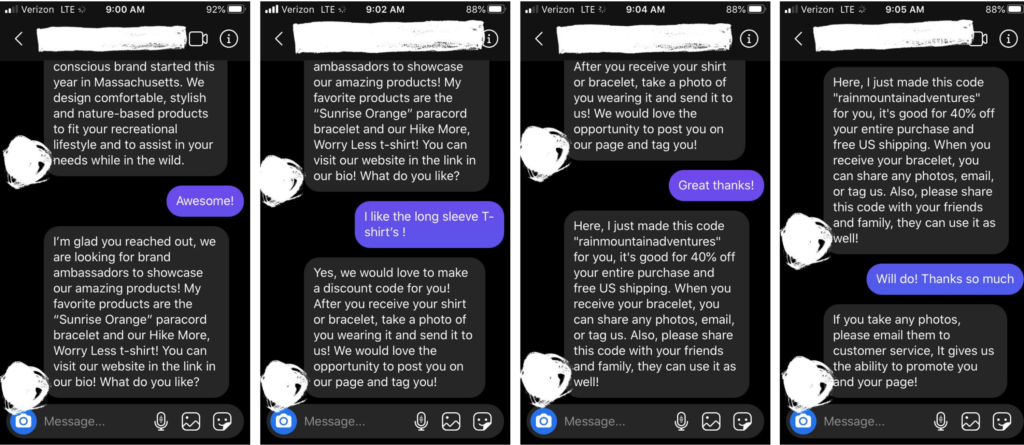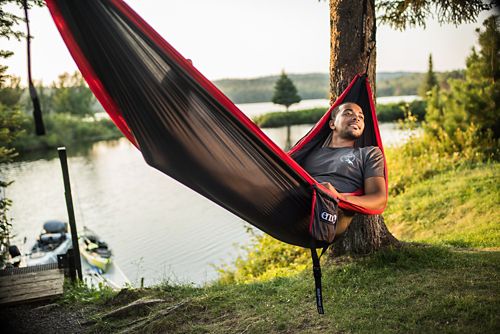Outdoor Professional Perks: Pro-Deals and Ambassadorships
I have been formally participating in outdoor recreation for two decades and teaching wilderness skills for 13 years – emergency wilderness survival, wildlife tracking, traditional crafts, and more. During that time, I have spent tens of thousands of dollars on gear. Even with opportunities to resell or trade pieces that did not work out, I’ve wasted tons of money. After nine years of purchasing equipment at full price, I realized that if I wanted to stay informed about products and provide quality input when asked for recommendations by clients, I needed to figure out better ways to finance future purchases.
Getting Started
I secured the first of my outdoor professional perks when I was 26. It was with what was at the time a small American-made company called Hill People Gear. A friend of mine had one of their packs, and I was impressed by the quality. After scrutinizing their website for weeks, I decided I wanted their Umlindi backpack. So, I wrote them an email explaining my background, why I was excited about their pack, what I would be using it for, and the types of clients I could help them reach.
Before my inquiry, they had never had anyone ask about professional discounts, and the process was awkward, though cordial. They ended up giving me a one-time use discount of 10% (due to sourcing and manufacturing in the US, this was virtually “at cost”). Since that time, I have arranged professional deals (ProDeals) with many companies. As my knowledge of ProDeals expanded, so too did my understanding of the industry. Below, I have outlined two standard outdoor professional ‘perks.’
This matters for you because these perks can damage the quality, authenticity, and accuracy of the information a ‘professional’ or ‘expert’ provides. Understanding where you’re getting your recommendations from, and the deals those pros might have behind the scenes is an important part of shopping for the best gear.
Professional Deals
ProDeals are one of the most common perks of being considered an outdoor professional, but all of them function a little differently. Companies that provide professional deal opportunities typically grant a 10-40% discount on their products. The ‘professional’ classification widely varies from company to company. Some require a brief email stating your background, why you are interested, and why they might benefit. If not satisfied with your initial ‘ask,’ they might request your resume or a link to your company bio. Chances are if the requirements are this relaxed, the company does not have a formal “pro” designation and will provide you a discount via checkout code. If you want to try another product in the future, you will likely have to reach out with another email.
Other companies, typically large ones, offer an application process for pros. These require some proof of work (paystub), credentials (guide designation), resumé, and a written component on why you should get a ‘pro’ designation (think college/job application). Receiving a pro designation from an application process is usually slower. You can be screened out of the process (via automation) even if you’re a perfect fit for the company. I tried in vain for many years to receive a pro classification from Eddie Bauer (one of the only companies to offer ‘tall’ sizing that isn’t code for ‘wide’). Eddie Bauer requires a guiding certification to consider someone for pro deals, which I do not have. I’m still a little irritated about it.
Companies provide ProDeals for a variety of reasons, some more honorable than others. For starters, outdoor gear is expensive (even small backpacking tents can cost thousands of dollars), and the industry is competitive. Most pros that I know, though certainly not all, operate on a relatively tight budget. The majority of their income goes right back into their profession since it often began as their hobby. Former pros themselves founded many outdoor companies, and they like to take care of their community, so they offer their gear at discounted prices.
While this might seem, and be, altruistic, it is not without impact on someone seeking a pro’s advice. For example, if I (the pro) have picked out two comparable fleece jackets from Patagonia and North Face, I will almost always purchase the fleece with the discount (all other things mostly equal). If asked by someone in a program I am teaching, I will happily disclose this ProDeal information. However, if not asked, my gear choices function as walking billboards. Even if you are not interested in a fleece jacket at the time, chances are the next time you go to purchase one; you will be psychologically primed. This is how marketing works, and ProDeals, while not exclusively so, is an arm of the marketing branch.
Ultimately, as far as outdoor perks go, ProDeals are innocuous. It is cheap advertising for a company, and there can be some questionable ethical practices among them. For example, some ProDeal authorizations request the pro not share their status within the company. However, a discount does not overly influence most pros I know. Instead, they’re an opportunity for outdoor professionals to become more informed about a wider variety of gear options than they might otherwise have been able to consider.
Ambassadorships
While I consider ProDeals innocuous – in fact, I actively encourage pros to pursue deals to bolster their overall industry knowledge – ambassadorships can quickly become ethically dubious. Like ProDeals, ambassadorships vary in structure and responsibility, but in my experience always include some form of financial opportunity that encourages a pro to push product.
Frequently, ambassadorships operate like this:
- Professional (or influencer) receives an initial purchase discount. This discount is not all that significant (~10% range).
- Professional receives an affiliate link or discount code to post on their website, Instagram, YouTube Channel, etc. – “Use my link, and you will receive XX off!” (10-20% range)
- Each purchase made via that link/code grants a percentage kickback to the ambassador (3-5% of purchase).
- When the kickback amount hits a certain threshold (set by the company), the ambassador receives a check in the mail. This kickback amount is wholly dependent on product sales and shifts depending on the industry the pro is an ambassador in. For example, in the canvas tent industry, where tents are potentially thousands of dollars, this threshold might be higher than an industry exclusively selling lower-priced jackets. If the ambassador sells some product, but not enough to meet the threshold amount, the company pays them nothing. Thresholds often reset after a year.
Given the way the ambassadorship incentive structure works, they are low stakes for a company. If the ambassador has a large following, the financial kickback is negligible for the company due to the moved amount of product. If the ambassador has a small following, there is a chance sales are bolstered a bit, with no cost to the company due to the ambassador not meeting the payout threshold. If that sounds ethically gross to you, you are not alone.
However, ambassadorships are also great tools for companies to gather targeted feedback and engage with the community. They’re also great opportunities for professionals to become more involved with companies that produce the products they love. One of my industry friends has worn the same wool garments for a decade; he has tested wool garments from other companies but thinks nothing compares. After singing their praises for many years, he accepted an ambassadorship. His does not provide him a direct financial incentive to push the product, but it does give him some additional perks. The company sends him free gear, especially new releases, looking for targeted feedback (“What do you think of the snap closure on this cuff? How does it function when riding/guiding?”). He’s also put in contact with prospective buyers looking for more information.
This is an ideal ambassadorship structure. My friend is still ‘biased’ but not in a way that encourages him to sell you something even if he is dissatisfied with its performance. The difficulty for you, someone that looks to a professional for advice, is that there is no easy way to discern an ambassador’s reward structure. It can be impossible to figure out if someone is hawking garbage to you for financial gain or if they genuinely love something and want to get it into your hands. This is especially true if you are limited by time and cannot do a deep dive into a company or professional’s history.
Shortly after writing this section, Hannah (girlfriend) and I were cold-approached on Instagram about becoming ambassadors for a company about which we know nothing. In this case, the ambassadorship functioned more like a Pro-Deal but with a promotional component. Keep in mind, all this company knows about us is that we work in the outdoor field, we have a small blog, and a modest Instagram following. It should come as no surprise that larger, more prominent “influencers” receive more lucrative (and problematic) offers. I have included some screenshots of the brief conversation.

Closing Thoughts
If you appreciated learning about a couple of the more common outdoor professional perks, then check out part two of this series. In it, I discuss Influencers, Affiliate Links, and Contracts; all perks that can significantly impact your ability to assess the validity and objectivity of a review.
If I sound like I am yelling at “Modernity” to get off my lawn, I might be. Just remember, I love the outdoors and want others to love being outside too, and I hate feeling buyer’s remorse. If any of those things resonate with you, then read on.



